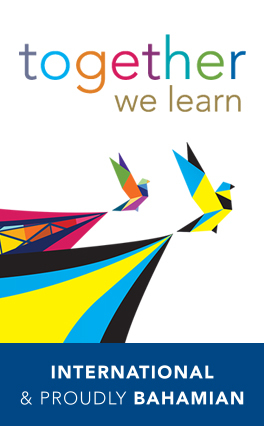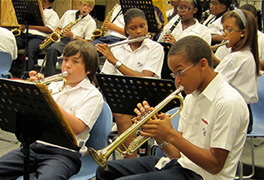
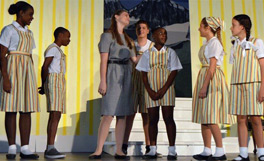
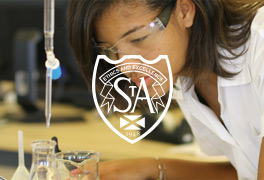
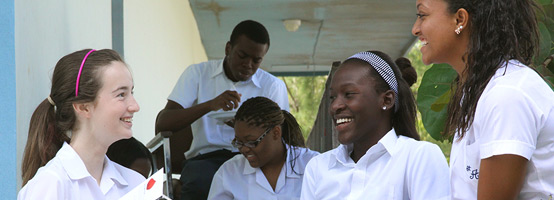
Founded in 1948, St Andrew’s has a long and proud tradition of providing an education of the highest quality to our students. Our reputation for Ethics and Excellence is recognised nationally, regionally and internationally, with many of our graduates going on to study at the world’s leading universities, including: Yale, Harvard, Stanford, Brown, McGill, Queen’s, Vassar, and many others.
St Andrew’s School first opened its doors in 1948 with an enrollment of 24 students. Its first headmaster was Reverend J. H. Poole, the Minister then in charge of St. Andrews Presbyterian Kirk. For the next two years, the students were accommodated in the Kirk Hall, and the name St Andrew’s was permanently adopted.
The School was founded by a group of parents who wanted their children prepared for admission into private boarding schools in Britain by the age of 13. At the time, the subjects taught in local Primary School did not include those necessary for entry into private British schools. Candidates for entrance were required to sit examinations in Latin and/or Greek, French, Algebra, Geometry, History, and Geography, in addition to the usual papers in English, Arithmetic and Religious Knowledge.
By 1950, the number of students had increased to 70 and the Kirk Hall was no longer an adequate location for the school. In that same year, a group of enthusiastic and far-sighted parents negotiated the purchase of the Collins property that borders both Shirley Street and Collins Avenue. The Collins mansion provided extensive quarters and a wonderful atmosphere for learning that enabled the school to grow to 160 pupils by 1954.
As St Andrew’s School enlarged, so did the number of parents who wished for their children to complete their secondary education either in North America or the United Kingdom. To meet these needs, it was necessary to widen the educational horizons of the School. Thus, in addition to offering the London University GCE ‘O’ Level courses and examinations, the School became a PSAT and SAT Examination Centre.
Over the next 15 years, the School’s population grew to 590 students and it was evident that new premises had to be sought. The existing School property at Yamacraw was acquired and a major fund raising effort then ensued, championed by students, teachers, parents, and the energetic and devoted Headmaster, Mr. John Chaplin. In early 1970, the ground was broken and by November 1971, the school had moved to the campus it occupies today.
Here at St Andrew’s School, The International School of The Bahamas, we are a community of national and international learners, where our teachers are committed to the success of each individual child, according to that child’s age, aptitudes and abilities.
We further believe that all children should be offered the opportunity at our school to learn in an atmosphere of trust, security and high educational standards, which will enable them to be well educated in all disciplines offered by the school, whether curricular or extra-curricular.
At the core of our philosophy is the belief that our school should encompass those who delight in learning and are ethical; thoughtful; knowledgeable; principled; caring; open minded; well balanced; reflective; inquirers; thinkers; communicators and who embrace new challenges and opportunities both at school and in society.
Relating to governance, we aim to have a balanced relationship between the school’s governing body and the school’s administration, which leads to strong, well-rounded educational programmes being offered on a carefully planned basis within the context of a balanced budget.
Relating to school programmes, we aim to offer educational programmes, which are based on solid research and best practice, are taught by well-qualified, caring teachers and enable the school to maintain its internationally accredited status.
Relating to educational process, we aim to foster in all students, a love of learning; to ensure that students have understanding and knowledge of all areas of the curriculum; to assist students in developing lively, inquiring minds; and to develop the mental and physical skills needed to fulfill their role as effective learners.
Relating to personal development, we aim to encourage students to live energetic, wholesome, productive lives and to provide them with pastoral care to aid in the development of positive attitudes and personal maturity.
Relating to values, we aim to foster in all students a strong sense of personal responsibility and sensitivity to those less fortunate; to encourage respect for religious and moral values; and to foster tolerance of all races, religions, opinions and ways of life, whilst maintaining an awareness of their own cultural heritages.
Relating to life, we aim to help all students to understand the world in which they live and the ever increasing importance of the interdependence of individuals, groups and nations in preparing for adult life and employment in an ever-changing world.
Relating to the environment, we aim to encourage community members to interact positively and sensitively with the environment.
Relating to equal opportunities, we aim to promote equal opportunities in all aspects of the school’s operations.
